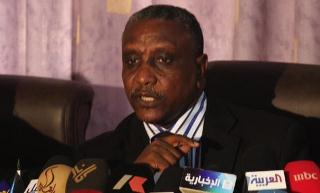SPLM-N secretary general calls for international pressure on NCP
By Toby Collins
October 04, 2011 (LONDON) – Secretary general of the Sudan People’s Liberation Movement – North (SPLM-N), Yasir Arman on Monday called upon the international community to put pressure on North Sudan’s ruling National Congress Party (NCP) to end hostilities in Blue Nile and South Kordofan states and to investigate atrocities committed there.

This event was part of the European leg of Arman’s international tour, in which he hopes to garner international support for the causes of the people of Blue Nile and South Kordofan states.
These are both states in which the forces of the SPLM-N are in conflict with Khartoum’s Sudan Armed Forces (SAF).
Arman noted that “now the SAF and the police are part of the NCP,” and called for a “professional police force and army that is for all of Sudan.”
Arman had recently arrived in Lond after addressing the US Congress and calling for an international investigation to be made into the events in the two states.
The SPLM-N is a faction of the party which now rules South Sudan – the Sudan People’s Liberation Movement (SPLM).
After the independence of South Sudan on 9 July, the former rebel movement, which fought North Sudan for more than two decades, the SPLM remaining in North Sudan became the SPLM-N.
Now it is engaged in conflict in the two border states.
At the London event the deputy head of mission to the embassy of the Republic of Sudan, Mohamed Eltom alleged that the “mayhem of the Nuba Mountains and the Blue Nile” was “planned by the SPLM” and that the SPLM-N troops are “being financed, supported […] by the SPLM from the South [Sudan].
In a statement in September Arman responded to allegations that the SPLM-N is financed by the Government of South Sudan (GoSS) by suggesting that “[the NCP is clearly looking for a scapegoat to hang their defeats on].”
The SPLM-N Khartoum office and others were forcibly shut and the arrest of numerous supporters also took place in September.
Arman said that the SPLM-N is “seeking to form an alliance, a broad national Sudanese consensus, a resistance umbrella,” describing an envisaged Sudan working on the principal of a union, akin to the European Union.
Arman was also critical of Eltom’s pro-NCP rhetoric which exposed a lack of political partiality expected of civil servants.
He said that during discussions about the disarmament of the Sudan People’s Liberation Army (SPLA) in North Sudan with the president of Sudan Omar al-Bashir, vice president Ali Osman Taha and vice president of the NCP Ali Nafie that security arrangements were based upon the assumption that South Sudan would not secede.
Now that South Sudan is an independent state he said that new security arrangements need to be made.
According to Arman, when Osman wrote in a letter, under the instruction of the Bashir, that the SPLA must surrender their arms in one week from 23 June, he responded in a statement asking the NCP to review this decision.
With regards the other marginalised people of North Sudan, Arman said the Beja and the marginalised people of East Sudan have a “just cause.”
The current governor of South Kordofan won a disputed election in May. Arman asked why the NCP had selected Ahmed Haroun, a man from North Kordofan, already wanted by the International Criminal Court for war crimes and crimes against humanity in Darfur as their winning candidate.
Arman suggested that the violence was premeditated and that it was because “they are doing the same as they did in Darfur, and Haroun is the only man who can do this in the Nuba Mountains.”
Regarding Sudan’s international relations, Arman alleged that Bashir has plans to destabilise Egypt and Libya.
Both of these countries have recently undergone regime changes after popular uprisings. Sudan has seen protests on a much smaller scale than many other countries recently but Arman praised the youths who have been taking to the streets in recent months.
(ST)
